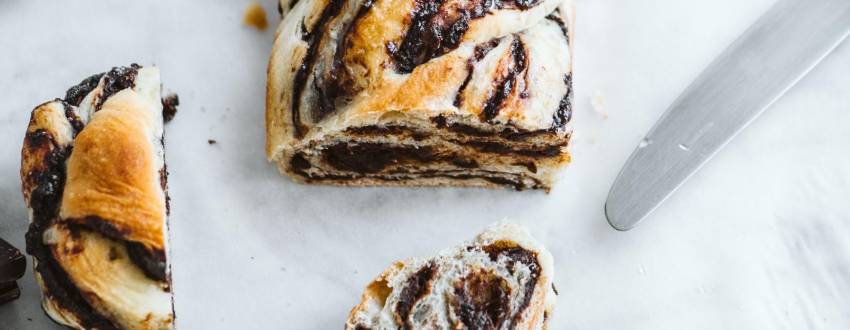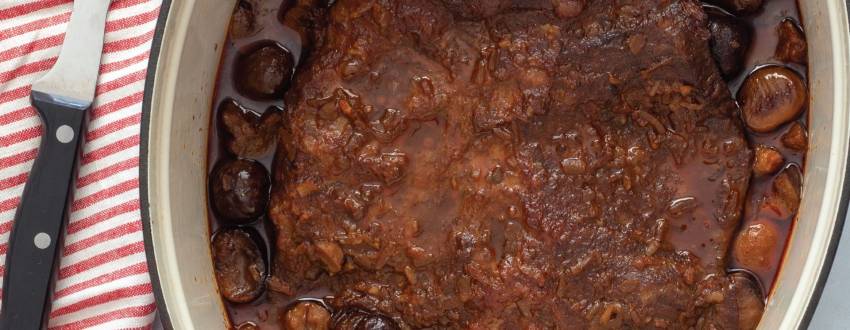Paris-based psychotherapist Kenden Alfond is a longtime vegetarian and vegan (and Kosher.com contributor). Her work for various humanitarian organizations has taken her to India, Afghanistan, Democratic Republic of Congo, Switzerland, and Cambodia. Kenden started her blog Jewish Food Hero in 2015 in order to get healthier plant-based food onto Jewish tables around the world as a way of improving our mental, emotional, and physical health.
“When I saw the Gil Marks cookbook Olive Trees and Honey in my twenties, I think more than the food, I started thinking about the intersection of Jewish food, vegetarian/vegan recipes, and personal health,” Kenden shares.
Beyond Chopped Liver is the third Jewish Food Hero cookbook and features healthy makeovers of over 50 classic Jewish recipes from various pre-modern Jewish Diaspora communities, including Ashkenazi, Sephardi, Mizrahi, Beta Israel/Ethiopian, and Indian Jewish communities, and from the modern Israeli and American Jewish food cultures. The classic comfort foods of our childhoods may vary from family to family, but whether you grew up with challah and matzo ball soup, kubaneh, adafina, or sabich, food is an integral part of Jewish culture.
However, many of these traditional foods are high in fat and calories. Kenden has removed much of the oil, fat and cholesterol by offering plant-based kosher parve alternatives while retaining the essence of the originals, whether it’s a root-based matzo soup, creamy mock whitefish salad, stuffed cabbage rolls, baked falafel, or beet and walnut salad with spiced non-dairy yogurt. You’ll also find breads like challah, no-knead fermented rye bread, and stovetop pita, and makeovers of timeless classics like chocolate prune babka, coconut macaroons, honey cake, and hamantaschen.
Modern health upgrades of beloved classics
Kenden’s goal in writing “Beyond Chopped Liver” is “to give some of our core Jewish foods some modern health upgrades so that we can serve food at our holidays, communal events, and in our homes every day that aligns with our personal health aspirations,” she shared via e-mail. Each recipe includes a description of the original dish including its geographical origin, along with changes made to improve the nutritional profile.
I’ve been vegetarian (and sometimes vegan) since 2004, so I appreciated the wide range of hearty main dishes in Beyond Chopped Liver including cabbage rolls, jackfruit brisket, butter bean coconut curry, and spinach-leek and mashed potato matzo mina pie. I also loved that variations are suggested for each dish, including ways to boost fiber and protein or to add a different texture, making them very versatile.

I made several of dishes from the cookbook for this review, including the lemon, garlic and parsley varnishkes, roasted pumpkin and apple spread, coconut rice with peas, and chocolate prune babka.

One of my earliest memories is of “helping” my Polish grandmother bake yeast breads with fresh yeast. Making the chocolate prune babka was the first time I’d attempted a vegan version, and the dough gets its richness and tear from some surprising help, including mashed potato (instant unflavored mashed potato flakes also work great!) and coconut milk. The filling is a combination of prunes and dark chocolate, with the flavors blending harmoniously without one overpowering the other.
The lemon, garlic and parsley varnishkes are a welcome update to a classic. Kasha was a frequent staple at my grandmother’s, and here it is livened up with lemon zest, a dash of heat from chili pepper, and freshness from parsley (this would also make a great picnic dish cold).

And if you enjoy Indian cuisine, the coconut brown rice with peas was a protein-packed flavor bomb loaded with rich coconut, warming spices, and plenty of textural contrasts from the toasted cashews and peas. The beautiful thing about these recipes is that you can customize with whatever you have on hand; I ended up using a cinnamon stick, cardamom, and pistachios to create a sweet and savory dish.
Kenden takes a whole foods approach to protein, including legumes and tofu, with no processed vegan meats substitutes or mock cheese. The health makeovers here are so well balanced that you won’t even miss the fat and cholesterol of the originals. Beyond Chopped Liver is a beautiful cookbook full of healthy, delicious recipes that everyone can enjoy.
You can purchase your copy here: Beyond Chopped Liver: 59 Jewish Recipes Get a Vegan Health Makeover
And for those of you who can’t get the words “chocolate prune babka” out of your head, here’s the special recipe for you.
Chocolate Prune Babka

This is a delicious, lower fat and lower sugar vegan babka. The recipe uses coconut milk to enrich the yeast-risen dough. Fat from the coconut milk makes the dough creamy and velvety, with potato puree and egg replacer providing extra stretch to give a fluffy, light texture. The chocolate filling is made with a mixture of prune paste, dark chocolate chips, and coconut milk. This babka truly is a healthier version of a decadent sweet food.
Prep time: 25 minutes, plus 4 hours rising time
Cook time: 35-40 minutes
Serves: 8
Dough:
2 teaspoons active dry yeast
1 teaspoon sugar
1/2 cup (120 milliliters) full-fat coconut milk
2 cups (240 grams) all-purpose flour + a bit more for kneading
1 tablespoon egg replacer + 2 tablespoons lukewarm water, mixed with a fork and thickened for 1 minute
1 potato, to yield 1/4 cup (60 grams) puree
1 tablespoon natural cane sugar
1 tablespoon canola oil
1 tablespoon oat milk
1 teaspoon salt
Filling:
1 cup (125 grams) dried prunes, chopped and soaked
1/4 cup (60 milliliters) lukewarm water
2 tablespoons coconut milk
1/8 teaspoon salt
1/4 cup (45 grams) vegan chocolate chips
Maple Syrup Wash:
1 tablespoon maple syrup
1 teaspoon water
Instructions
1. Soak one cup of pitted and chopped prunes in one-fourth cup of lukewarm water and set aside until the filling stage.
2. Peel and dice the potato and place in a saucepan, add water to cover the potato pieces, and boil for 12 minutes. Drain, mash with a fork, and set aside to cool.
3. In a saucepan, heat the coconut milk (for the dough) until only just lukewarm, then transfer to a bowl.
4. Add the yeast and one teaspoon of sugar to the lukewarm coconut milk. Use a fork to whisk together and leave to proof for 10 minutes.
5. Transfer proofed yeast to a large prep bowl and add flour, thickenedegg replacer, potato puree, sugar, canola oil, oat milk, and salt. Mix to combine.
6. Knead the dough on a lightly floured surface for five to seven minutes.
7. Return the dough to the large bowl, cover, and allow to rise for one and a half to two hours until doubled in size.
8. Make the filling: blend the soaked prunes (and any liquid remaining), coconut milk, and salt until smooth and set aside. Melt the chocolate using a double boiler (a glass bowl set on top of a pan of hot water). Add the prune paste mixture and stir together until it forms a thick paste.
9. On a lightly floured surface, roll the dough into a rectangular shape about one-fourth-inch thick. Spread the filling evenly on top.
10. Roll the dough into a long roulade and cut lengthwise with a sharp knife.
11. Twist the two parts of the dough together, forming a double helix shape. Place in a high-walled bread pan.
12. Leave the babka to rise a second time for an hour and a half, until the dough has doubled in size.
13. Carefully transfer to an oven preheated to 350 degrees Fahrenheit to bake for 30 to 40 minutes until golden brown, or until a toothpick inserted in the center comes out clean.
14. Meanwhile, combine the maple syrup and water for the maple wash. As soon as babka is done baking, paint on a thin layer of maple wash to add shine. Be careful not to add too much or the babka will go soggy.
15. Allow to cool for 10 to 15 minutes, then slice and serve.
Find more Jewish Food Hero recipes and inspiration over on Instagram.



.jpg)



Reviews